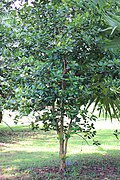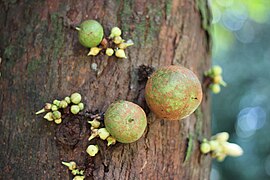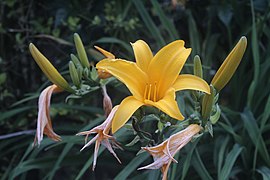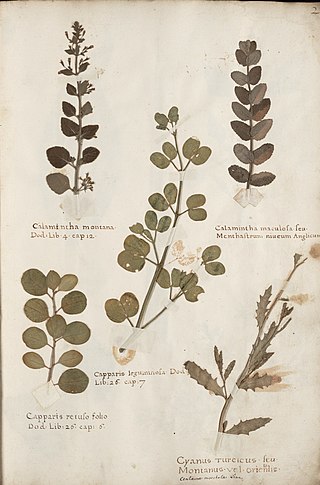
A herbarium is a collection of preserved plant specimens and associated data used for scientific study.
Articles related to Cameroon include:

Buea is the capital of the Southwest Region of Cameroon. The city is located in Fako Division, on the eastern slopes of Mount Cameroon, and has a population of 300,000. It has two Government Hotels, the Mountain Hotel and Parliamentarian Flats Hotel located around The Government Residential Area.

The Meise Botanic Garden, until 2014 called the National Botanic Garden of Belgium, is a botanical garden located in the grounds of Bouchout Castle in Meise, Flemish Brabant, just north of Brussels. It is one of the world's largest botanical gardens, with an extensive collection of living plants and a herbarium of about 4 million specimens. The current garden was established in 1958 after moving from central Brussels; the former site is now the Botanical Garden of Brussels.

The Berlin Botanic Garden and Botanical Museum is a botanical garden in the Lichterfelde locality of the borough of Steglitz-Zehlendorf, Berlin, Germany. Constructed between 1897 and 1910 under the guidance of architect Adolf Engler, it has an area of 43 hectares [ha] and around 22,000 different plant species. The garden is part of the Free University of Berlin.

Prunus africana, the African cherry, has a wide distribution in Africa, occurring in montane regions of central and southern Africa and on the islands of Bioko, São-Tomé, Grande Comore, and Madagascar. It can be found at 900–3,400 m (3,000–10,000 ft) above sea level. It is a canopy tree 30–40 m in height, and is the tallest member of Prunus. Large-diameter trees have impressive, spreading crowns. It requires a moist climate, 900–3,400 mm (35–130 in) annual rainfall, and is moderately frost-tolerant. P. africana appears to be a light-demanding, secondary-forest species.

Voacanga africana is a small tree native to tropical Africa belonging to the family Apocynaceae that grows to 6 m (20 ft) in height and bears leaves that are up to 30 cm (12 in) in length. The yellow or white flowers are succeeded by paired, follicular, dehiscent fruit with a mottled green exocarp and a pulpy, yellow mesocarp surrounding the seeds. The plant contains alkaloids acting as CNS depressants and hypotensives
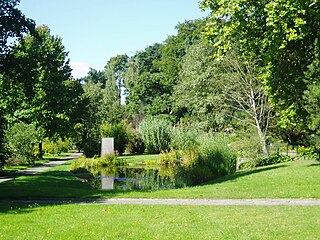
The Botanical Garden in Potsdam, is a botanical garden and arboretum maintained by the University of Potsdam. It has a total area of 8.5 hectares, of which 5 hectares are open to the public, and is located immediately southwest of the Orangery Palace at Maulbeerallee 2, Potsdam, in the German state of Brandenburg. It is open daily; an admission fee is charged for the glasshouses only (2017).
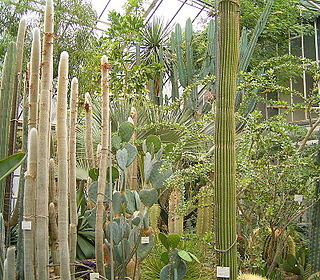
The Botanischer Garten der Universität Heidelberg, also known as the Botanischer Garten Heidelberg, is a botanical garden maintained by the University of Heidelberg. It is located at Im Neuenheimer Feld 340, New Campus, Heidelberg, Baden-Württemberg, Germany; portions are open to the public daily except Saturday without charge.

The Botanischer Garten der Christian-Albrechts-Universität zu Kiel, or less formally the Botanischer Garten Kiel, is a botanical garden and arboretum maintained by the University of Kiel. It is located at Am Botanischen Garten 1, Kiel, Schleswig-Holstein, Germany, and open daily.

The National Botanic Garden of Bangladesh and the Bangladesh National Herbarium make up the largest plant conservation center in Bangladesh, with an area of around 84 hectares. It is located at Mirpur-2 in Dhaka - 1100, beside the Dhaka Zoo. It was established in 1961. It is a botanic garden, a knowledge center for nature lovers and botanists and a tourist destination. The herbarium has a scientific collection of approximately 100,000 preserved specimens of plants.
Preussiodora is a genus of plants in the family Rubiaceae. It contains only one species, Preussiodora sulphurea, native to central Africa.

The Conservatory and Botanical Garden of the city of Geneva is a museum and an institution of the City of Geneva.

The National Herbarium of New South Wales was established in 1853. The Herbarium has a collection of more than 1.4 million plant specimens, making it the second largest collection of pressed, dried plant specimens in Australia, including scientific and historically significant collections and samples of Australian flora gathered by Joseph Banks and Daniel Solander during the voyage of HMS Endeavour in 1770.
Hubert Winkler was a German botanist, who specialized in tropical flora research.
The following is a timeline of the history of the city of Yaoundé, Cameroon.
Uvariopsis zenkeri Engl. is a species of flowering shrub in the family Annonaceae endemic to Cameroon and the Central African Republic.
Preussiella is a genus of flowering plants belonging to the family Melastomataceae.





